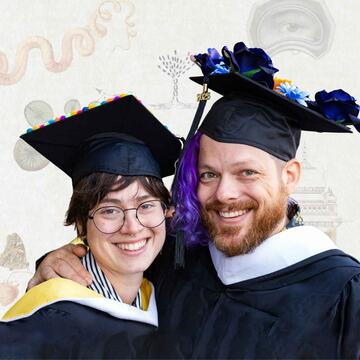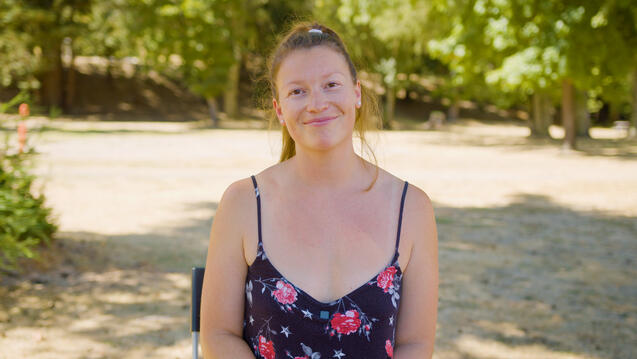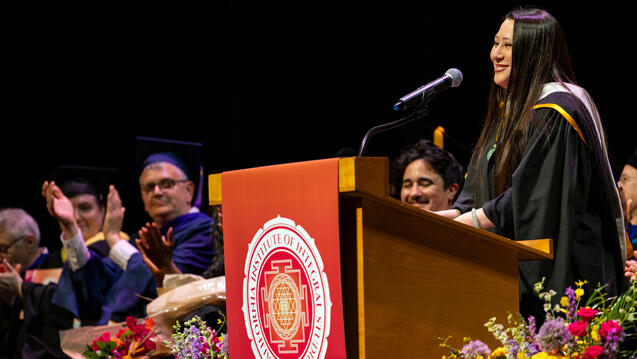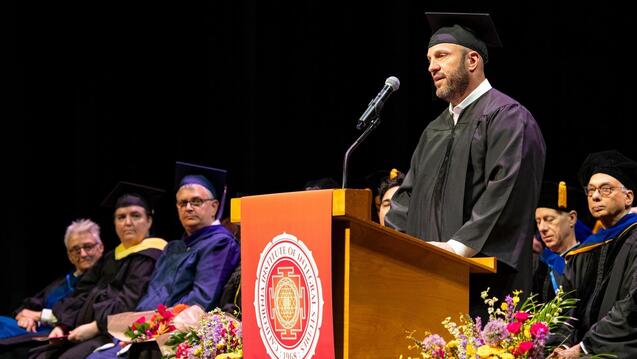Marine Corps veteran Bre Butler discovered a path to healing and transformation through CIIS' Integrative Health Studies program after five years of active duty service.
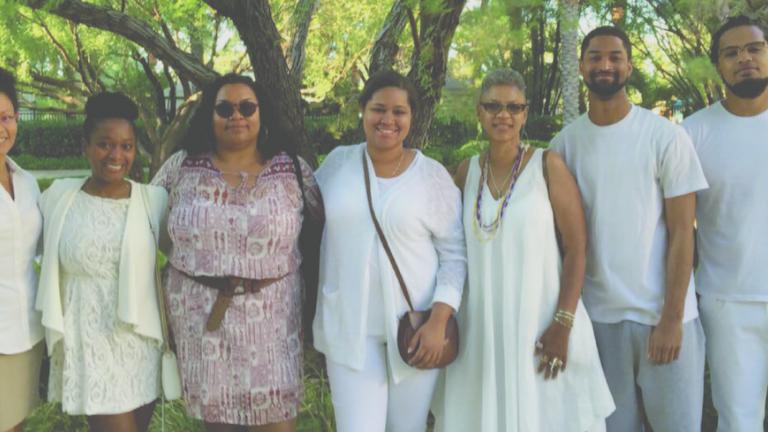
Black Students Bring African-Centered Voice to Counseling Psychology
Warrior-Healers Rise
Inspired by the President's Initiative on Diversity, Inclusion, and Intercultural Sensitivity, Rachel Bryant, MHSA Project Director, and I began a yearlong pilot project last Spring to create the MHSA-ABPsi Cohort* (the Cohort).
The Cohort, which comprises five Black students from a variety of the Master's in Counseling Psychology concentrations, includes Channing Richmond and Natalie Bell (Integral Counseling Psychology), Dondre Coleman (Drama Therapy), Tibebe "Tupi" Worku (Community Mental Health), and Tayyibah Hasan and Majal Logan (Expressive Arts Therapy).
"The Cohort supports the values and goals of the MHSA Project at CIIS by providing Black students with culturally relevant theories and clinical skills for working in their communities," says Bryant. "I am grateful for Adeeba's years of experience and knowledge in the field of African-Centered Psychology."
We officially launched the first Cohort last Fall in concert with the ABPsi's 47th Annual International Convention, Warrior-Healers Rise: A Call to Action to Reclaim, Resurrect, and Restore the African Psyche. Students' participation in the four-day convention and its more than 100 workshops included Cohort members raising questions about gender politics, sexuality, and the application of African-centered nosology in community mental health.
Black male graduate psychology students often express concerns about isolation and that the full range of their life experiences are not reflected in traditional Western curricula. For Cohort members Worku and Coleman, the convention offered an intervention-a rare opportunity for Black male psychology professionals to connect with one another.
"I think what was most powerful about this experience was to have my understanding of the possibilities of professional psychology expanded inward and outward," says Worku.
It was transformational to see that I was part of a movement of indigenous psychology and activism, whose very nature is based on my existence, my communities' existence, and our contributions to the world.
Richmond, perhaps, best sums up the convention experience. "I was able to interact and learn from the association's founders and leading theorists in Black psychology, and gain information that I now incorporate into my work as a student and training clinician." For Logan, this means connecting the cultural past with the present, a concept known as Sankofa.
Bay Area Benefits
One of the many benefits of being in the Bay Area is our relationship with ABPsi's local chapter, the Bay Area Association of Black Psychologists (BAABPsi). Among its leaders is Dr. Wade W. Nobles, Chair Emeritus of Ethnic Studies at San Francisco State University, and a co-founder of ABPsi. The connection enables the Cohort to have direct contact with a seminal thinker and scholar in the field of African-Centered Psychology.
"I am very grateful for the work that Rachel and Adeeba have done to build this connection for CIIS students," says Judie Wexler, Academic Vice President Emerita. "Our students, and the profession, will benefit from the mentorship of the project and the exposure to African-Centered Psychology."
Cohort member Coleman affirmed the need for dialogue about the experience of what it means to be a Black person at CIIS. "It's good that we have the space where we can be there for one another and push each other to continue on our educational journey," he says.
Bell notes that being part of the Cohort has given her "a chance to cultivate new professional relationships with colleagues and mentors in the field. Within the Cohort, there's room to explore difference, respect legacy, and grow," she says.
Speaking Truth to Power
As part of their commitment to the project, Cohort members help shape and participate in several on-campus activities that support their academic growth and interest in Black-African Psychology. They include: 29 Days of Blackness, Black Student Luncheon, NTU Psychotherapy Weekend, activist student group TRANSGRESS.
Student Diversity Protest, and the exhibition Expanding the Frame: Liberatory Practices in Psychology. Students also engage in community-based activities and attend local ABPsi and Bay Area Black Student Group meetings.
Also built into the project is our Jegnaship program. Jegna is an Ethiopian word that means "a very brave person who is a protector of culture." A jegna is not afraid of speaking truth to power and is full of integrity; and jegnaship is a cultural congruent mentoring process.
Through this process, the Cohort expands its footprint at CIIS, opening up the ABPsi experience to its larger Black student body. The intention is to become an officially recognized Student Chapter of ABPsi.
Coming Full Circle
For me, bringing together ABPsi and CIIS has been a dream of mine since first becoming a BAC student in 2010. The knowledge we share in the formal setting of the Cohort has helped me to refine my own doctorate research and discover my own voice as a scholar and teacher. My aspirations have become a reality.
Related Academic Department
Related News
Integral Counseling Psychology M.A. graduate Marissa Huang gave one of two student speeches at CIIS’ 57th Commencement Ceremony.
B.S. in Psychology graduating student Dominic Bucci delivered one of two student reflections at CIIS’ 57th Commencement Ceremony.
